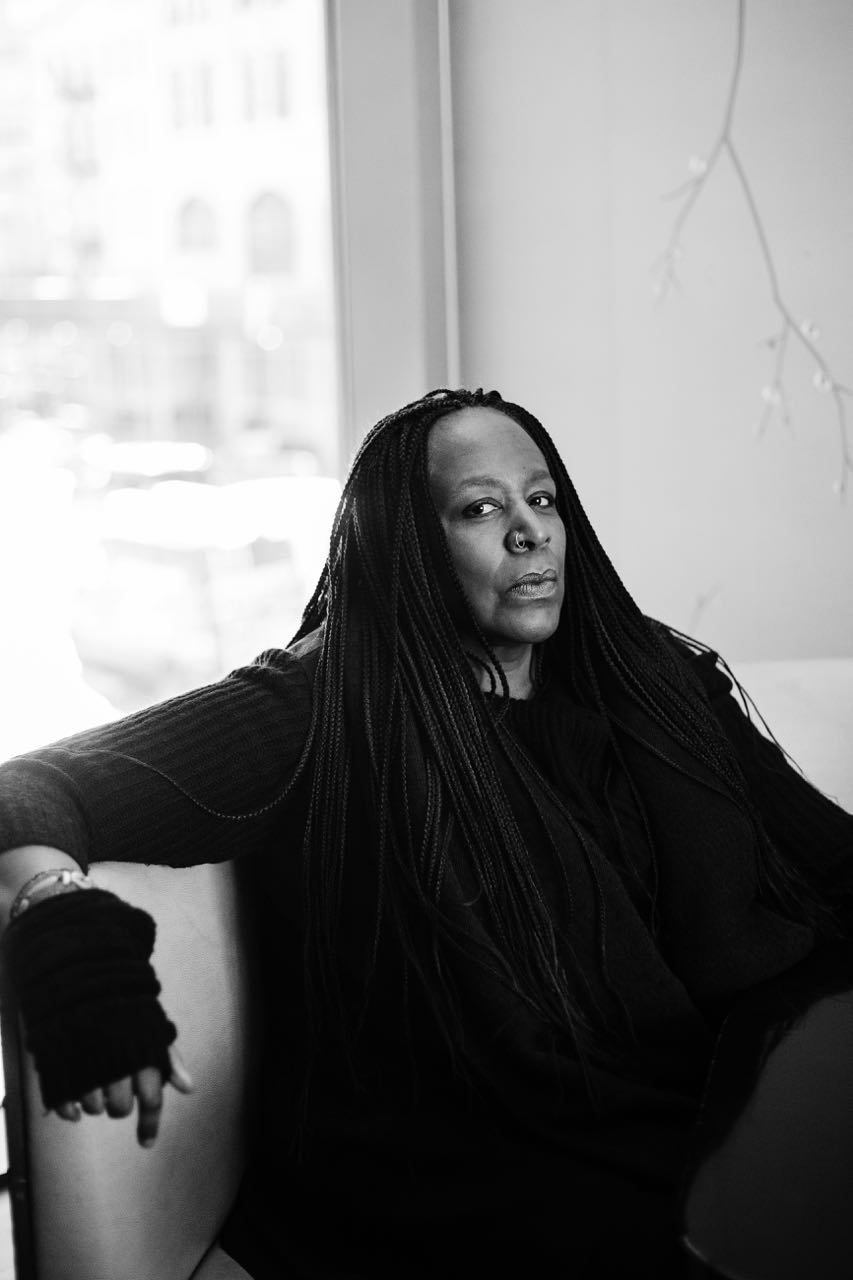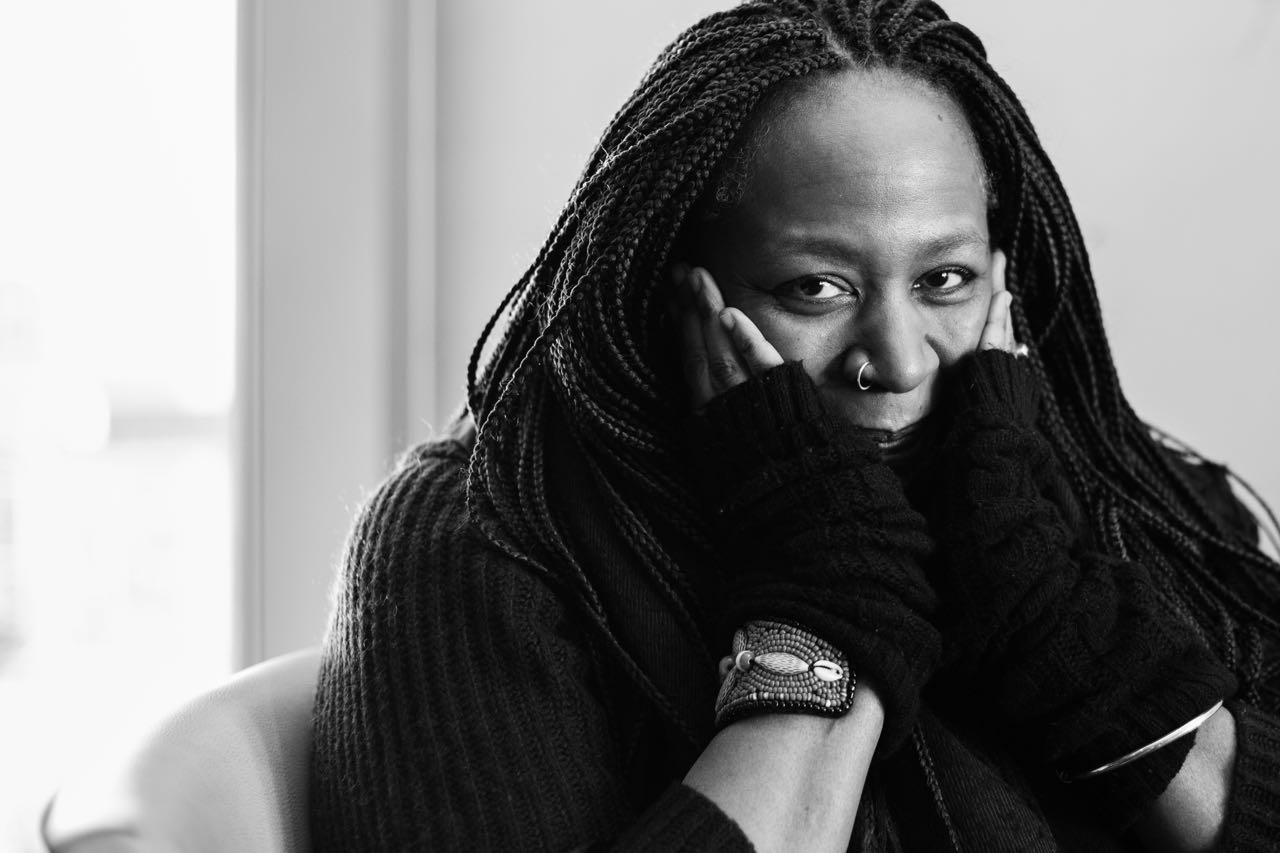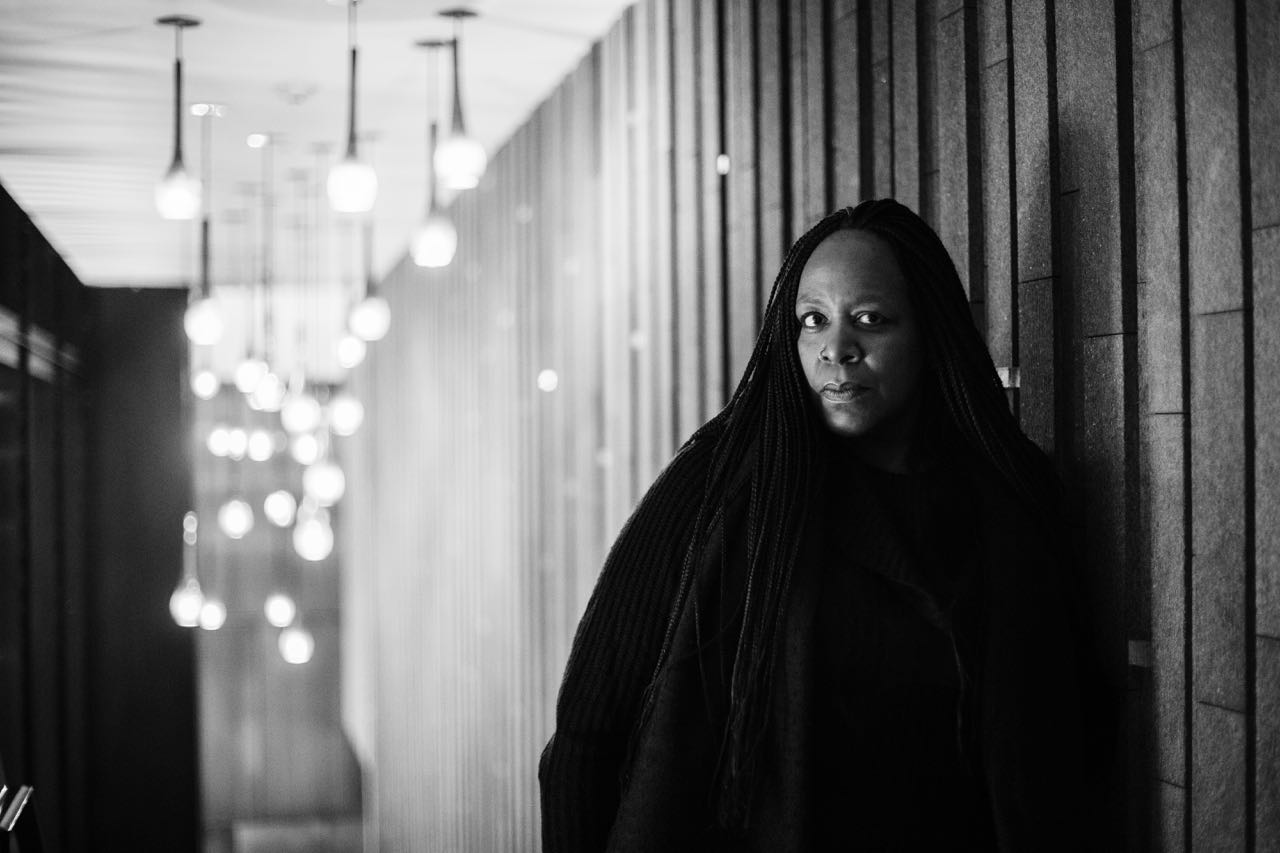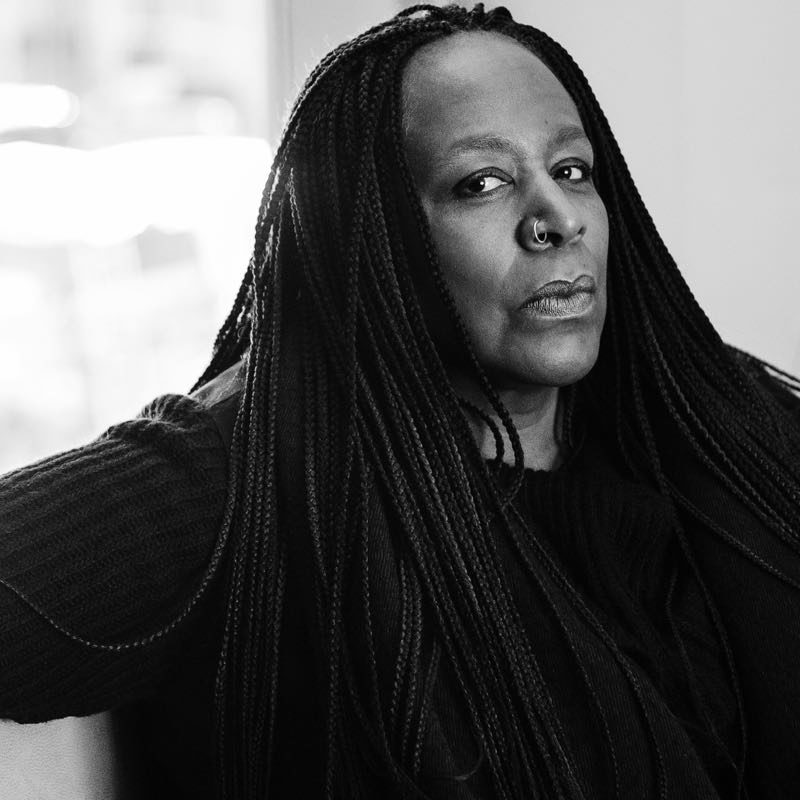Dael Orlandersmith on “Until the Flood”

Written by Victoria Myers
Photography by Tess Mayer
February 1st, 2018
In 2015, playwright Dael Orlandersmith went to St. Louis, under commission from Repertory Theatre of St. Louis, to interview people about their thoughts on race and the death of Michael Brown, the unarmed black teenager killed by a police officer in 2014. From those interviews, she created fictional characters for her solo show, Until the Flood, which had its premiere in St. Louis in 2016 and is currently being performed by Dael at the Rattlestick Theatre. As a writer, her work includes both solo and multi-character plays, and she is best known for her play Yellowman, which was a finalist for the Pulitzer Prize for Drama in 2002. Other work includes Beauty’s Daughter, The Gimmick, and Forever. We recently spoke to her about her process for creating Until the Flood, what she thinks people get wrong about her work, and how it has evolved.
For Until the Flood, you went and you did a lot of interviews and spent a lot of time with people in Ferguson?
Not a lot. St. Louis Repertory Theater approached me because they had a thing they’re dealing with. They were dealing with so-called Ferguson fatigue, which was, they said, that the suburb of Ferguson was being known only for quote-unquote shootings. Because prior to Michael Brown being shot in 2013, there were nine black men who were pulled over and/or shot and attacked by policemen. So, they said, what they wanted to do was to bring a theatre piece in to help create some sort of dialogue, how it can be acknowledged, because a lot of people didn’t know how to quote-unquote acknowledge it. There are different kinds of theatre that can invoke and provoke some sort of conversation. So that’s why they called me in.
So I went there and I interviewed certain people. And I made it very clear that these are composites. I’m not going at it like the way Anna Deavere Smith does, who does it in a great way by portraying the actual people. I wanted to get a sense of what it felt like, where does race stand here beyond the Michael Brown shooting. So that’s the way it came about. I interviewed a whole bunch of people, including Michael Brown, Sr.
How did you approach those conversations?
I’d say, ”Listen, this affects me and it affects the rest of the country,” but also a word that I’m going to use heavily is “boundary.” So how do you think Michael Brown’s shooting affects you? How does race play a role in things in terms of the Ferguson area, in terms of the St. Louis area? What was your family background in reference to race? And I was asking everybody those questions.
Did you go in with an idea of what the piece was going to be?
I knew that it could not be about Michael Brown and Darren Wilson because nobody knows what happens within those moments. There are their individual stories, and then you’ve got what happened within those moments that no one knows. That gets into who’s right, who’s wrong. Did Darren deserve to pull his gun? Did Michael make the first move? Or did he not? No one knows that stuff. And people are going to really jump on that anyway. So I really wanted to be more complex than that. What does it mean in terms of your day to day life? This shooting. How does it become a catalyst for you, racially, in terms of the way these individuals feel about race? So I was coming with that, and just letting people who were residents of Ferguson and the St. Louis area talk. I would say, “Tell me about your experiences with race here,” and just let it rip.
Since you knew you were going to make this into a play when you were having those conversations, did you feel like there were certain things you were looking for to become dramatic narrative?
I didn’t think like that. I mean, I knew I was going to have it, you know, but I wasn’t looking at somebody and thinking that right then and there. I just wanted to get their story. It’s dramatic no matter what; the fact that people sit down with you to talk about their lives, there is a form of drama within that. I really wanted to hear the individual stories.
I would sit down and see what we could use and what we couldn’t use. I was also aware of the fact that people are going to embellish too. It’s amazing—I should write about that—how certain people all of a sudden became political activists because they found it was going to be a play or, “Oh, you know, I’ve done some acting too.” So there’s also that side of it. Some people are using this as a form of a fame thing.
How did you pick the people you talked to?
I went with what I thought were the stronger stories. And not everybody that I spoke with is necessarily in the play either. The Dougray character is not somebody I spoke to. He was somebody who would sit in the restaurant and shoot me dirty looks. And somebody said, “Well, we know him. He always comes in and lets us know he’s a self-made man.” I was like, “Oh, okay.”
There’s the Joan Didion documentary on Netflix that came out recently, and there’s a part in it where they ask her about writing the essay “Slouching Towards Bethlehem” and being in San Francisco talking to people. There’s a part in the essay where she goes into a home and meets a young child covered in LSD. In the documentary, they’re like, “How did you feel when you walked in and you saw a five year old who was high on LSD?” And there’s a long pause where you think she’s going to be like, “Oh, it was so awful,” or something like that. Instead she goes, “It was gold,” since as a writer that’s what you’re looking for, those types of moments. I wanted to ask your thoughts on that type of thing: when you’re going and talking to people while knowing you are going to use it for something creative, and you get to those big emotional impact moments in their stories that you’ll be using for your work.
Well, that’s the idea of a three-year-old that is quote-unquote fantastic, but then also for me as a playwright, that’s a whole different thing. You have to look at the subtleties. It’s not just let’s go for the big stuff. You have to look at the complexities of human nature. So that’s what’s interesting. It’s like, to look at somebody and go, “Okay, how does this person think?” I’m looking at body movement, the whole deal. It’s not just making it a quote-unquote big moment. Certainly it does have to be dramatic, but when I’m sitting and talking with somebody like that, it was a new process for me. It was getting a sense of their story, but I always find people fascinating anyway. So, in terms of going for something dramatic, no, that wasn’t how it works in my head.
It was all about this event, which was big. The event was the one that made it. Having the people respond to the event was the thing that was interesting to me. I was saying, just let them talk, and stuff would come out with that. You’d be surprised.

Were you writing some as you were going? Or were you taking notes and then coming back to it to actually sit down and write?
I took notes, and then I just began to write. And then obviously the imagination kicked in as well.
When you were doing that first draft did you feel like you knew what the arc was going to be?
Yes. So I started honing it and all kinds of stuff like that, yeah.
What was your writing process like?
[All of the characters] are composites. You’re looking at what could be. There’s theatrical truth to it, which is: maybe this isn’t verbatim, but it’s within the realm of possibility. Like the guy, for instance, who was staring at me, who I named Dougray. They said he was a self-made man from West Virginia. So in my head I was going, “He doesn’t seem to be a stupid man because he was reading.” I forgot what we was actually reading, but I called it Hemingway. He came from that tough part of Charleston, West Virginia. I know what’s there. So, I studied Charleston, West Virginia and just took it from there.
Did you feel any pressure when you were writing? You mentioned at the beginning that the project came from people having fatigue about the issue, and it’s also a subject where people have strong opinions. Were you thinking about that as you were writing, and did you feel any sort of external pressure on what the play should be?
A little bit. I just wanted it to be realistic. That was my whole thing. I think the stories were strong, but I always want to make sure their stories felt realistic. Did I manage to get the vibes of the communities?
Did you feel any pressure for it to be educational or to teach people something?
I don’t really think that way because I speak to, not for, people. Beginning, middle, end. Story, conflict, resolution. That’s what theatre is. So all these fully developed characters—did I give birth to these characters where we may not necessarily like them, like Dougray? You may not like him, but do you understand him? You don’t have to like him, but do you have empathy for him.
Do you find that people project certain ideas on to this type of work?
Yes. In theatre, people do that all the time. There’s always going to be somebody who wants their own sense of justice, especially with this. They have their own sense of justice that explains if someone else’s is true. Speak for me, speak to me. I want you to tell me who did what. We don’t know who did what within those individual moments. Who was right? Who was wrong? Whatever that means. It’s not, for lack of a better term, that black and white.
Do you feel like people also project things onto this particular form of solo performance?
It’s funny, because the way this is written, I’m doing it as a solo, but it can be a multi-character, it can be a single character, anybody of any race and/or gender, as long as you have the chops to do it. So, even though I’m doing it as a solo, it can be many different things. Having said that, there is an intimacy within it being solo and in a small theatre space. Sometimes I walk off stage and I’ll go, “What the hell just happened?” It’s nice to realize that certain people are processing things.
As a performer, since it’s long monologues rather than dialogue, did you have to figure out where to give people more time to listen? Since listening to a monologue is different than reading it on the page.
Yeah and no. Because the audience becomes the actor too. You’re imagining that you’re talking to somebody, and you’re imagining what their responses would be. And that’s the thing that jumps off that. The text becomes the actor. The audience also becomes the actor.
How do you feel this piece fits into the themes of your work?
The outsiders. I’m interested in the people that don’t necessarily fit and the thing that gives you permission to be uncomfortable. I like dark work because you’re forced to learn about certain things. That’s what interests me.
How do you feel your work has evolved?
Even though I’m doing a solo show now, the play I’m best I’m known for is a play called Yellowman, which is not a solo play, and that’s the one that was nominated for the Pulitzer. It’s always interesting to me when people just assume that I just do solo stuff. To me, it’s all just theatre, whether it’s solo or multiple. That’s the evolution for me, too. It’s also to write a piece like this where it can be done by anybody. I’m doing multi-character, so that’s the evolution. Thinking outside the box.
I think most people do put things in boxes, and don’t just think of everything as “It’s all just theatre.”
The reason people will hesitate with certain solo work is because they became a huge confessional. Everybody was writing about their story. Every interesting story doesn’t necessarily mean it’s a piece of theatre. Because theatre is about language. Theatre is about the imagination. It’s not necessarily the exact verbatim. It can be, but even within the verbatim, there’s still going to be something fantastical because it’s going to be that person’s take on something.
So, to compartmentalize it, which began to happen in the 90s up until, say, the mid-2000s when people started writing about their lives because they were out of work—that’s what the problem was. When you have people, whether it’s multi-character or single character, doing great stuff, they’re fun pieces of theatre. Diana Oh’s piece was a fun piece of theatre. David Cale [with] Harry Clark. A Streetcar Named Desire, piece of theatre. Hamilton, piece of theatre. To me it’s just that: multi, single, whatever it is, that’s the way I view it. I’m writing something that’s multi-character. I’m not in it either.
How do you think the development process of new work can be improved?
Well, first of all, it’s time to get some younger people in there. Diversification. And also more time for people to have time to do their art. Not wham, bam, thank you ma’am. You have to really invest in having younger dramaturgs. Having more women, people of color, LGBT+ people. There has to be a mix. It’s about investing in younger voices, as well.
How do you feel the theatrical landscape has changed?
It’s just beginning to include younger people, which is great. And also the fact that younger people now can afford to go to the theatre. The bad stuff is happening now in terms of people misusing their power. That’s the thing that bothers me within the theatre. That’s always been, but that’s the thing. And the voices are now becoming much more diverse. Slowly but surely it’s happening. It’s great.
What do you mean by misusing their power? That can mean a lot of different things.
Well, there are certain people that need to get out of the way. They’ve been running the theatre too long and they’ve lost perspective. And they’re not taking any chances. That’s the bad side of it. That’s what I mean by misuse of power. And not really looking at diversifying their audiences. That’s the thing.
What do you feel people get wrong when they think about New York theatre in the 90s?
When people start holding on to their stuff back in the day, it’s never as dramatic as they make it out to be because you have a responsibility to grow. It wasn’t that romantic for me back in the 90s. It was okay. I mean, I’m much more excited about now than I was back then. When people deify a time, I’m like “Oh my God, you’re lost, you’ve kind of cut off your nose. You’re stuck.” There’s a certain performer that always talks about “back in the day,” and I see how they have kind of slowed their growth. Every era has great work, right?

You mentioned before that you felt like one of the things people got kind of wrong about your work is that they just thought of you as a solo performer. What else do you think people get wrong about the work?
Well, it’s a given that I’m black and female. I don’t think that black female playwright is a given. I write about all kinds of stuff. I don’t like to be compartmentalized. That’s the thing that gets to me. I hate that.
Did you always have that attitude or was it something that developed over time?
No, I’ve always felt like that. I’ve always got in that fight all the time. I write all kinds of stuff for different kinds of people. Don’t compartmentalize me. I hate it. Always. I fight that vehemently.
What other areas of culture affect your work?
Painting. Rock and roll. I love the Velvet Underground. That’s one of my favorite bands. And also literature. Somebody like James Baldwin. One art show that’s really under my skin is Louise Bourgeois at MoMA. I’ve seen it about three times.
When you’re writing do you listen to music?
Sometimes, yeah. Depends what I’m writing too. Sometimes Velvet Underground. Sometimes baroque music. I love baroque music.
Do you do anything visual when you’re writing?
Meditation. I’m hypocritical because I’m cursing the whole time. A lot of times I’m cursing to music, “Hey, son of a bitch.” But yes, meditation.
When you’re writing do you see the work as a theatre piece—do you see it on stage while you’re writing? Or do you see it like real people in real time situations?
Both. Sometimes a fusion of the two.
With this piece, did you change anything based on how rapidly our political climate is changing?
I wrote this three years ago. It’s stronger now because of the assaults on black men in Milwaukee and Chicago. Trayvon Martin was 2012. Michael was 2014. Only two years since then, the progression, man. So it’s stronger now than it ever was. Actually people say, “It’s interesting that you’re doing this now.” Yeah, it’s relevant. The last poem, that was [the only thing that changed]. That’s it, but otherwise no. I was done.
What do you hope audiences take away from the piece?
I hope they they’re moved. I hope it invokes and provokes thought and conversation.
And since you talked before about what people might get wrong about the work, what do you wish people would talk about?
Different kinds of truth. Not necessarily what applies to them, but does it open their minds in terms of them thinking about the way other people see the world? And not be locked in their little cocoon. That’s what’s interesting to me.

